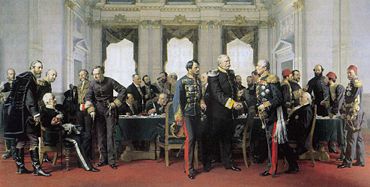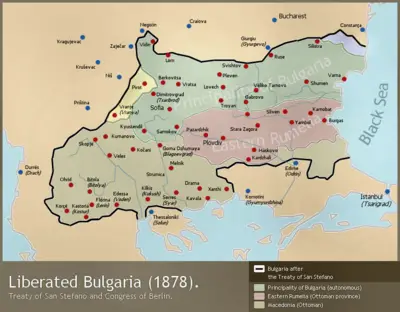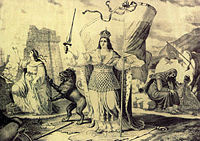Difference between revisions of "Congress of Berlin" - New World Encyclopedia
| Line 114: | Line 114: | ||
* Pamuk, Şevket. 2000. ''A monetary history of the Ottoman Empire.'' Cambridge studies in Islamic civilization. Cambridge: Cambridge University Press. | * Pamuk, Şevket. 2000. ''A monetary history of the Ottoman Empire.'' Cambridge studies in Islamic civilization. Cambridge: Cambridge University Press. | ||
ISBN 9780521441971 | ISBN 9780521441971 | ||
| − | + | * Quataert, Donald. 2005.'' The Ottoman Empire, 1700-1922. New approaches to European history.'' Cambridge, UK: Cambrige University Press. | |
| + | 9780521839105 | ||
[[Category:History]] | [[Category:History]] | ||
{{Credit|254434214}} | {{Credit|254434214}} | ||
Revision as of 04:34, 12 December 2008
The Congress of Berlin (June 13 - July 13, 1878) was a meeting of the European Great Powers' and the Ottoman Empire's leading statesmen in Berlin in 1878. In the wake of the Russo-Turkish War, 1877–78, the meeting's aim was to reorganize the countries of the Balkans. Otto von Bismarck, who led the Congress, undertook to balance the distinct interests of Britain, Russia and Austria-Hungary. As a consequence, however, differences between Russia and Austria-Hungary intensified, as did the nationality question in the Balkans.
The congress was aimed at the revision of the Treaty of San Stefano and at keeping Constantinople in Ottoman hands. It effectively disavowed Russia's victory over the decaying Ottoman Empire in the Russo-Turkish War, 1877-78. The Congress of Berlin redistributed back to the Ottoman Empire certain Bulgarian territories that the previous treaty had given to the Principality of Bulgaria, most notably Macedonia.
The congress formally recognized independence of the de facto sovereign states of Montenegro, Serbia and Romania, as the 27th-29th free states of the world.
Proceedings
The Congress was attended by the British Empire, Austria-Hungary, France, the German Empire, Italy, the Russian Empire and the Ottoman Empire. Delegates from Greece, Romania, Serbia, and Montenegro attended the sessions in which their states were concerned, but were not members of the congress.
The congress was solicited by the rivals of the Russian Empire, particularly by Austria-Hungary and Britain, and hosted in 1878 by Otto von Bismarck. The Congress of Berlin proposed and ratified the Treaty of Berlin.
The meetings were held at Bismarck’s chancellory, the former Radziwill Palace, from June 13, 1878 until July 13, 1878. The congress revised or eliminated 18 of the 29 articles in the Treaty of San Stefano. Furthermore, using as a foundation the treaties of Paris (1856) and Washington (1871), the treaty effected a rearrangement of the Eastern situation.
Main issues
The principal mission of the World Powers at the congress was to deal a fatal blow to the burgeoning movement of pan-Slavism. The movement caused serious concern in Berlin and particularly in Vienna, which was afraid that the repressed Slavic nationalities would revolt against the Habsburgs. London and Paris were nervous about the diminishing influence of the Ottoman Empire in the south and about Russian cultural expansion to the south, where both Britain and France were poised to colonize Egypt and Palestine.
Through the Treaty of San Stefano, the Russians, led by chancellor Alexander Gorchakov, had managed to create the Bulgarian autonomous principality under Ottoman Empire's nominal rule, thus sparking British well-entrenched fears of growing Russian influence in the East. This state had access to the Aegean Sea and comprised a very large portion of Macedonia that could have at any time threatened the Straits that separate the Black Sea from the Mediterranean.
This arrangement was not acceptable to the British Empire, which considered the entire Mediterranean to be, in effect, a British sphere of influence, and saw any Russian attempt to gain access there as a grave threat to its power. Just a week before the Congress, Prime Minister Benjamin Disraeli had concluded a secret alliance with the Ottomans against Russia, whereby Britain was allowed to occupy the strategically placed island of Cyprus. This agreement predetermined Disraeli's position during the Congress and led him to issue threats to unleash a war against Russia if she did not comply with Turkish demands.
Ceding to Russia's pressure, Romania, Serbia, and Montenegro were declared independent principalities. The full independence of Bulgaria, however, was denied. It was promised autonomy, and guarantees were made against Turkish interference, but these were largely ignored. The Dobruja was given to Romania; Montenegro obtained Niksic, Podgorica, Bar, and Plav-Gusinje. The Turkish government, or Porte, agreed to obey the specifications contained in the Organic Law of 1868, and to guarantee the civil rights of non-Muslim subjects. Bosnia and Herzegovina were placed under the administration of Austria-Hungary.
Russia agreed that Bulgaria should be split up into three parts. The southwestern part remained under Turkish rule. Eastern Rumelia became an autonomous province and the remainder was the new state of Bulgaria. Russia retained southern Bessarabia and Austria received the right to "occupy and administer" Bosnia and Herzegovina, a controversial clause which eventually precipitated the Bosnian crisis of 1908.
Bismarck as host
The Congress of Berlin is frequently viewed as the culmination of the "Battle of Chancellors" involving Alexander Gorchakov of Russia and Otto von Bismarck of Germany. They were able to effectively persuade other European leaders that a free and independent Bulgaria would greatly improve the security risks posed by a disintegrating Ottoman Empire. According to German historian Erich Eyck, Bismarck supported Russia's persuasion that "Turkish rule over a Christian community (Bulgaria) was an anachronism which undoubtedly gave rise to insurrection and bloodshed and should therefore be ended."[1] He used the Great Eastern Crisis of 1875 as proof of growing animosity in the region.
Bismarck's ultimate goal during the Congress of Berlin was not to upset Germany's status on the international platform. He did not wish to disrupt the Three Emperor's League by choosing between Russia and Austria as an ally.[2] In order to maintain peace in Europe, Bismarck sought to convince other European diplomats on dividing up the Balkans so as to foster greater stability. During the process of division, Russia began to feel short-changed even though she eventually gained independence for Bulgaria. One can therefore see the underpinnings of the alliance problems in Europe prior to the First World War.
One reason why Bismarck was able to mediate the various tensions present at the Congress of Berlin stemmed from his diplomatic persona. He was an ardent pacifist when international affairs did not pertain to Germany directly. On the other hand, Bismarck seethed with aggression [citation needed] whenever Germany's national interest was on the line. And at the Congress of Berlin, "Germany could not look for any advantage from the crisis" that had occurred in the Balkans back in 1875.[3] As a result, Bismarck claimed impartiality on behalf of Germany at the Congress. This claim enabled him to preside over the negotiations with a keen eye for foul play.
According to Henry Kissinger[4], the congress saw a shift in Bismarck's Realpolitik. Until then, as Germany had become too powerful for isolation, his policy was to maintain the Three Emperors League. Now that he could no longer rely on Russia's alliance, he began to form relations with as many potential enemies as possible.
Legacy
Italy was dissatisfied with the results of the Congress, and the situation between Greece and Ottoman Empire was left unresolved. The Bosnians and Herzegovinans would also prove to be a problem to the Austro-Hungarian Empire in later decades. The League of Three Emperors, established in 1873, was destroyed, as Russia saw lack of German support on the issue of Bulgaria's full independence as a breach of loyalty and alliance. The establishment of a border between Greece and Turkey failed to be accomplished. In 1881, after protracted negotiations, a compromise border was accepted after a naval demonstration of the Powers. So, the congress sowed the seeds of further conflicts, including the Balkan Wars, and the First World War.
Delegates
Great Britain
- Benjamin Disraeli
- Marquess of Salisbury
- Lord Russell
Russia
- Prince Gorchakov
- Count Shuvalov
- Baron d'Oubril
Germany
- Otto von Bismarck
- Prince Hohenlohe
- Chancellor von Bülow
Austria-Hungary
- Count Andrássy
- Count Károlyi
- Baron Heinrich Karl von Haymerle
France
- Monsieur Waddington
- Comte de Saint-Vallier
- Monsieur Desprey
Italy
- Count Corti
- Count De Launay
Ottoman Empire
- Karatheodori Pasha
- Sadoullah Bey
- Mehemet Ali Pasha
- Catholicos Mkrtich Khrimian (representing Armenian population)
Romania
- Ion C. Brătianu
- Mihail Kogălniceanu
Greece
- Theodoros Deligiannis
Serbia
- Jovan Ristić
Montenegro also sent delegates. ==
Legacy
18th protocol of the Berlin Congress
the establishment at Constantinople of a Financial Commission composed of specialists named by their respective Governments, which Commission shall be charged to examine into the complaints of the bondholders of the Ottoman debts, and to propose the most efficacious means for satisfying them as far as is compatible with the financial situation of the Porte;
Notes
- ↑ Erich Eyck, Bismarck and the German Empire (New York: W.W. Norton, 1964), 245-46.
- ↑ Erich Eyck, Bismarck and the German Empire (New York: W.W. Norton, 1964), 245-46.
- ↑ Erich Eyck, Bismarck and the German Empire (New York: W.W. Norton, 1964), 245-46.
- ↑ Kissinger, Henry (1995-04-04). Diplomacy. Simon & Schuster, 912. ISBN 0671510991. p139-143
=References
- Anderson, M. S. 1991. The Eastern question, 1774-1923: a study in international relations. Houndmills: Macmillan Education. ISBN 9780333037812
- Dill, Marshall. 1970. Germany; a modern history. Ann Arbor: University of Michigan Press.
- Glenny, Misha. 2000. The Balkans: nationalism, war, and the Great Powers, 1804-1999. New York: Viking.
- Medlicott, W. N. 1979. The Congress of Berlin and after: a diplomatic history of the Near Eastern settlement, 1878-1880. London: Methuen. OCLC 5300454
- Medlicott, W. N. 1956. Bismarck, Gladstone, and the Concert of Europe. London: University of London, Athlone Press. OCLC 1087542
- Pamuk, Şevket. 2000. A monetary history of the Ottoman Empire. Cambridge studies in Islamic civilization. Cambridge: Cambridge University Press.
- Quataert, Donald. 2005. The Ottoman Empire, 1700-1922. New approaches to European history. Cambridge, UK: Cambrige University Press.
9780521839105
Credits
New World Encyclopedia writers and editors rewrote and completed the Wikipedia article in accordance with New World Encyclopedia standards. This article abides by terms of the Creative Commons CC-by-sa 3.0 License (CC-by-sa), which may be used and disseminated with proper attribution. Credit is due under the terms of this license that can reference both the New World Encyclopedia contributors and the selfless volunteer contributors of the Wikimedia Foundation. To cite this article click here for a list of acceptable citing formats.The history of earlier contributions by wikipedians is accessible to researchers here:
The history of this article since it was imported to New World Encyclopedia:
Note: Some restrictions may apply to use of individual images which are separately licensed.


